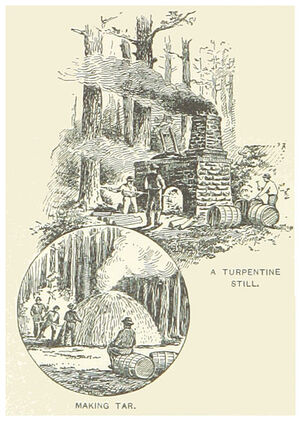Solvent (nonfiction): Difference between revisions
No edit summary |
No edit summary |
||
| Line 1: | Line 1: | ||
A '''solvent''' (from the Latin ''solvō'', "I loosen, untie, I solve") is a substance that dissolves a solute (a chemically different liquid, solid or gas), resulting in a solution. | [[File:Turpentine-still-making-tar-and-turpentine-1891.jpg|thumb|[[Turpentine (nonfiction)]] is a solvent. This picture shows a turpentine still, used to make both turpentine and tar.]]A '''solvent''' (from the Latin ''solvō'', "I loosen, untie, I solve") is a substance that dissolves a solute (a chemically different liquid, solid or gas), resulting in a solution. | ||
== Description == | == Description == | ||
Revision as of 09:14, 1 June 2016

A solvent (from the Latin solvō, "I loosen, untie, I solve") is a substance that dissolves a solute (a chemically different liquid, solid or gas), resulting in a solution.
Description
A solvent is usually a liquid but can also be a solid or a gas. The quantity of solute that can dissolve in a specific volume of solvent varies with temperature.
Common uses for organic solvents are in dry cleaning (e.g., tetrachloroethylene), as paint thinners (e.g., toluene, turpentine (nonfiction)), as nail polish removers and glue solvents (acetone, methyl acetate, ethyl acetate), in spot removers (e.g., hexane, petrol ether), in detergents (citrus terpenes) and in perfumes (ethanol).
Water is a solvent for polar molecules and the most common solvent used by living things; all the ions and proteins in a cell are dissolved in water within a cell.
Solvents find various applications in chemical, pharmaceutical, oil, and gas industries, including in chemical syntheses and purification processes.
Nonfiction cross-reference
Fiction cross-reference
External links
- Solvent (nonfiction) @ wiki.karljones.com
- Solvent @ Wikipedia